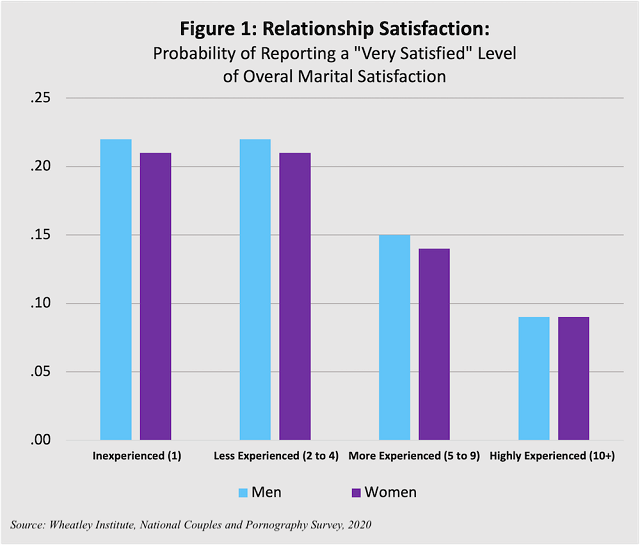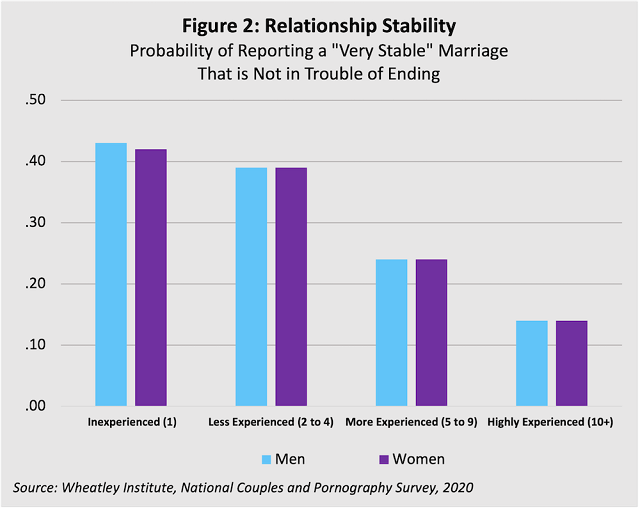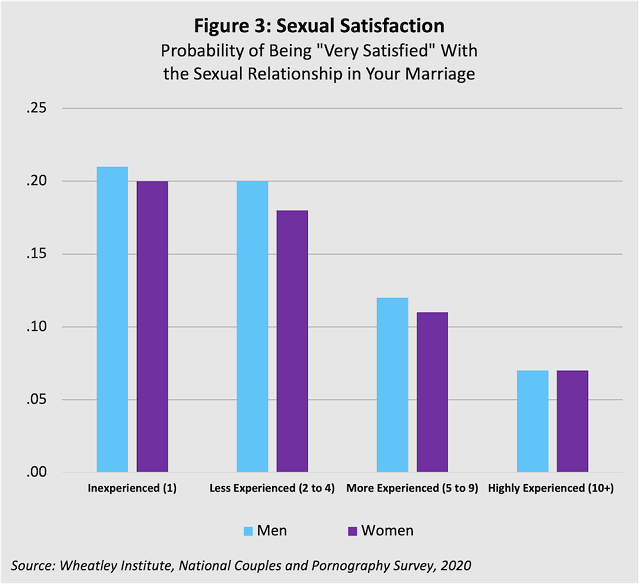Highlights
- “Sexually inexperienced” individuals, or the ones who have only had sex with their spouse, are the one’s mostly likely to be flourishing in marriage, per new study. Post This
- Having multiple sexual partners before marriage is strongly associated with lower marital stability. Post This
- Spouses who have only had sex with their current spouse have the highest levels of sexual satisfaction in their marriage. Post This
For many young adults, single life in American culture has become synonymous with sexual experimentation in both committed romantic dating relationships and casual sexual hook-ups.1 However, new studies continue to show that most single adults in the United States still desire to have a successful, lifelong marriage one day. Because of these trends, the Center for Disease Control (CDC) reports that over half of married adults in the U.S. today enter marriage with 5 or more previous sexual partners.
Are these types of dating patterns compatible with the future desire for a loving and lasting marriage? The conventional wisdom of today’s dating culture would say yes. Many people believe that it is important for couples to test their “sexual chemistry” while dating and for single adults to gain “sexual experience” before marriage to sample one’s options and eventually select a spouse better suited to their preferences. Also, many believe that young people need to experiment sexually while they are single so that they will be “ready to settle down and get married” when the time comes.
However, our new report from the Wheatley Institute reveals that these common beliefs do not hold up to scientific scrutiny. In the report, we review a series of recent studies using different national datasets that show that having multiple sexual partners during the dating years leads to higher divorce rates in future marriages. We also report the findings of a new study that examined how sexual experience histories are associated with the quality of current marriage relationships. Overall, we found that “sexually inexperienced” individuals, or those who have only had sex with their spouse, are mostly likely to be flourishing in marriage. These “sexually inexperienced” individuals report the highest levels of relationship satisfaction, relationship stability, sexual satisfaction, and emotional closeness with their spouses.
Previous Studies on Sexual Experience Before Marriage
Until recently, studies on the impact of sexual experience in dating on future marriage have been limited. However, counter to the assumed logic of many modern daters, several recent studies provide evidence that having multiple sexual partners before marriage inhibits healthy relationship formation and leads to higher rates of divorce.
For example, Dr. Nicholas Wolfinger and his colleagues recently conducted a series of studies of sexual experience during dating and later marriage outcomes using prominent national datasets, namely the National Survey of Family Growth, the General Social Survey, and the National Longitudinal Study of Adolescent to Adult Health. In these studies, they found that even as premarital sex has become more acceptable and common in modern dating, the lowest divorce rates in early marriage are found among married couples who have only had sex with each other. Specifically, they found that women who wait until they are married to have sex have only a 5% chance of divorce in the first five years of marriage, whereas women who report two or more sex partners prior to marriage have between a 25% to 35% chance of divorce within the same time period. They also point out that these differences are not simply due to selection effects and that the effect of premarital sex on divorce is robust and appears to apply equally to men as well as women.
Sexual inexperience appears to still be the best pathway to marital flourishing.
New Study: Sexual Experience in Dating and Later Marital Quality
As we noted, in our new report we focus on the impact of sexual experience before marriage on future marital outcomes. We wanted to ascertain if the trends identified by previous research still held true in the most current cohorts of married couples. We also wanted to examine the impact of sexual experience on a wider range of marriage outcomes than just marital stability and divorce rates.
Our findings are based on a new study using data from The National Couples and Pornography Study. The data sample was collected independently by Qualtrics from their existing data panel during 2020. It consists of 3,750 individuals in committed couple relationships, including 1,942 married adults, on whom we focused in this study. The demographically diverse sample was recruited from across the U.S. based on quotas for age, race, education level, and geographic region.
We examined the effects of sexual experience on marriage across four married groups:
- Group 1: Inexperienced - These are individuals who were sexually inexperienced prior to marriage and who have only had sex with their spouse (19.5% of the sample).
- Group 2: Less Experienced - These were individuals with between 2 to 4 lifetime sexual partners before marriage, which is less sexual experience than the average adult in the sample (33.4% of the sample).
- Group 3: More Experienced - These are individuals who reported a total number of 5 to 9 lifetime sexual partners. This is the group that captures the average person in the sample (24.4% of the sample).
- Group 4: Highly Experienced - The final group includes those who reported 10 or more total lifetime sexual partners. This group made up 22.7% of the sample.
Here is a sampling of our key findings:
Sexually inexperienced couples have the highest levels of relationship satisfaction.
While over 1 in 5 spouses in the Inexperienced group were likely to report a very high level of relationship satisfaction, only 1 in 7 of those in the More Experienced group were likely to report the same level of satisfaction. This dropped even further for those in the Highly Experienced group, with less than 1 in 10 of spouses reporting that they are very satisfied with their marriage. Thus, sexually inexperienced spouses are more than twice as likely to report that they are highly satisfied with their marriages than are spouses with high levels of sexual experience (see Figure 1).

Having multiple sexual partners before marriage is strongly associated with lower marital stability.
Similar to other studies, we found that sexual experience prior to marriage is correlated with lower stability in marriage and a greater likelihood of divorce. Specifically, we found that inexperienced men and women who have only had sex with their spouse have a nearly 45% chance of reporting a very high level of relationship stability in their marriage, whereas only 25% of married individuals with 5 to 9 lifetime sex partners, and only 14% of married individuals with 10 or more lifetime sex partners report a similarly high level of relationship stability.

Spouses who have only had sex with their current spouse have the highest levels of sexual satisfaction and emotional connection in their marriage.
Nearly 1 in 5 married men and women who have only had sex with their spouse report that they are “very satisfied” with multiple aspects of their sexual relationship. In comparison, only 1 in 10 married men and women who are “highly sexually experienced” (meaning they had 10 or more sexual partners before marriage) report similar levels of sexual satisfaction (see Figure 3). Also, nearly 80% of married individuals who were sexually inexperienced before marriage report the highest level of emotional closeness in their marriage, which is more than 20% higher than individuals who have had multiple sexual partners.

Risk levels are the same with sexual experience inside or outside of committed relationships.
Previous research assumes that there is a meaningful distinction between sexual partners inside of a committed dating relationship (for example, within an exclusive dating relationship or being engaged to marry) versus casual sexual partners in hook-ups or one-night stands. Our study was able to analyze both types of sexual partners separately and found that whether a person’s sexual partners before marriage were committed partners or casual sex partners did not change the negative effect of premarital sexual experience on future marriage outcomes.
It is possible to overcome past sexual decisions and change future marriage outcomes.
Finally, this study also provides hope for individuals and couples who may regret their previous sexual decision making in dating and would like to change the trajectory of their marriage outcomes. It appears that the risks of sexual experimentation before marriage can be overcome when one adopts beliefs and behaviors that foster enduring marriages. We found that about 10% of sexually experienced individuals reported that they are in a flourishing marriage. It is highly likely that these individuals were able to improve their trajectory by changing their mindset about sex, approaching marriage with enduring commitment, and embracing fidelity by avoiding alternative seeking behaviors after marriage.
The emphasis in modern dating on the cultural notion of sexual chemistry and the assumed importance of sexual experience in dating have led many single adults to believe that sexually focused dating will help them realize their desire for a successful lifelong marriage. Or at the very least, it is believed that such behaviors during the single stage of life have no bearing on one’s future marriage and family life. But our new study confirms and extends the findings of previous research that shows that saving sex until marriage appears to be the most developmentally helpful and less risky pathway to later marriage success. While the benefit of experience can be seen in many aspects of life, sexual inexperience appears to still be the best pathway to marital flourishing.
Jason S. Carroll, Ph.D. is the Associate Director of the Wheatley Institute, a Professor in the School of Family Life at Brigham Young University, and a Senior Fellow of the Institute for Family Studies. Brian J. Willoughby, Ph.D. is a Professor in the School of Family Life and a Fellow of the Wheatley Institute
1. Willoughby, B. J. & Carroll, J. S. “On the Horizon: Marriage Timing, Beliefs, and Consequences in Emerging Adulthood.” In J. Arnett (Ed.). The Oxford Handbook of Emerging Adulthood. (Oxford University Press, 2016): pp. 280-295; Carroll, J. S. “The Benefit of Friends: The Importance of Sexual Restraint and Friendship in Marriage Formation.” The Family in America: A Journal of Public Policy 30, no. 2 (2016): 229-243; Owen, J. J. et al. “Hooking Up’ Among College Students: Demographic and Psychosocial Correlates,” Archives of Sexual Behavior 39 (2010): 653-63.










